Miswak (Salvadora Persica)
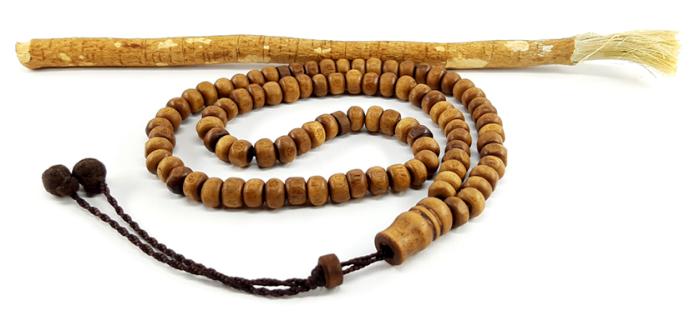
Also known as the toothbrush tree, Miswak is a small evergreen tree native to the Middle East, Africa, and India. It is used traditionally for cleaning teeth and is mentioned by the World Health Organization (WHO) for oral hygiene use. Several scientific studies have shown that Miswak has anti-bacterial, antifungal, anti-viral, ant cariogenic, and anti-plaque properties. It also has anti-oxidant, analgesic, astringent, and anti-inflammatory properties.
The use of Miswak dates back to ancient times. Various evidences and research suggest that Miswak contains over ten naturally occurring constituents essential for maintaining good oral and general health. It is also an effective treatment for primary periodontal diseases and is best for preventing the growth of oral microbes and dental plaque.
The anti-microbial property of Miswak helps cease the process of tooth decay and inhibits the growth capability of several cariogenic microorganisms. Anti-microbial extracts are obtained from different parts of S. Persica. It has been proven scientifically that these extracts are equally effective compared to the efficacy of oral disinfectants, including Chlorhexidine Gluconate. Chlorhexidine Gluconate has antifungal, anti-plasmodia, and anti-bacterial effects when used at an optimal concentration. The anti-microbial effects of Miswak are said to be more pronounced against Enterococcus Faecalis, Porphyromonas Gingivalis, Actinobacillus, Haemophilus influenza, and S. Mutans and limited against Lactobacillus.
Licorice – Glycyrrhiza Glabra
Licorice, also known as Yashtimadhu, sweetwood, or Mulhatti, is a herbal ingredient in Edinora Ayurvedic toothpaste that have immense potential in the treatment of orofacial diseases. It is rich in secondary metabolites which are used in cosmetics, foods, and both traditional and modern medicine.
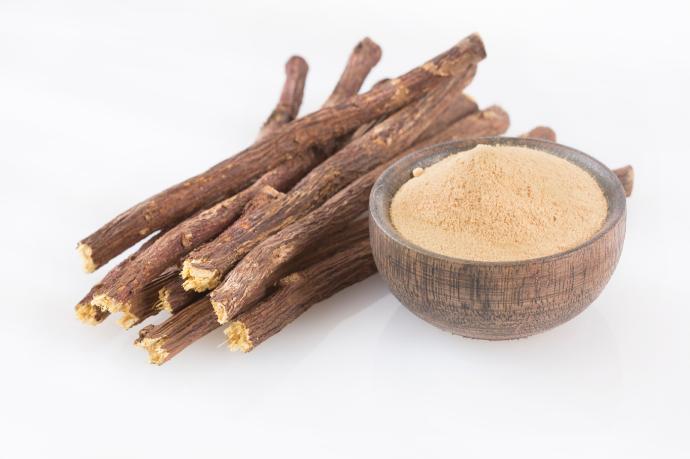
It has well-known properties such as anti-viral, glucocorticoid, anti-inflammatory, anti-oxidant, anti-ulcerative, anti-carcinogenic, and many more. Liquorice extracts and licorice bioactive ingredients such as Glabridin, Licoricidin, Licorisoflavan A, Licochalcone A, and Glycyrrhizin have beneficial effects in preventing and treating oral diseases. The anti-inflammatory, anti-adhesive, and anti-microbial properties of Licorice have shown beneficial effects in oral diseases like dental caries, gingivitis, periodontitis, aphthous ulcers, and oral cancer.
Chebulic Myrobalan
Known as ‘King of Medicines’, Haritaki (Terminalia Chebula Retz., Family: Combretaceae) is considered a valuable ingredient in Edinora herbal toothpaste in the prevention and treatment of several oral diseases such as dental caries, spongy and bleeding gums, Gingivitis, and stomatitis. It possesses great therapeutic value and is widely distributed across India. Due to the same, Chebulic is always listed first in Ayurveda.
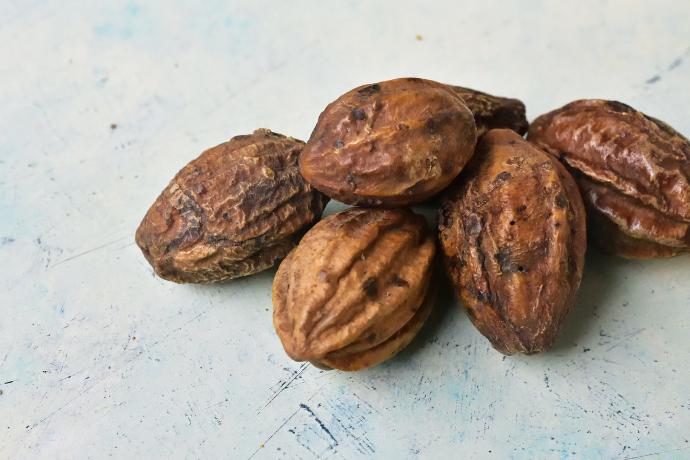
It is one of the key ingredients in Triphala and is widely used in wound healing, fungal infections, and inflammations of the mucous membrane of the mouth. Studies have shown Terminalia Chebula carry out antibacterial activities against several Gram-positive and Gram-negative human pathogenic bacterial species and antifungal and antiviral properties. It is also effective against Streptococcus mutans.
Beleric Myrobalan
Terminalia Bellirica, also known as Baheda, Bahera, Beleric, or Bastard Myrobalan depending on the region, is a large deciduous tree common on plains and lower hills in South and Southeast Asia. It is one of the main ingredients of ‘Triphala’, a well-known powdered preparation in the Indian system of medicine (ISM) - Ayurveda. Beleric Myrobalan has various therapeutic effects, including its anti-caries, anti-oxidant, anti-collagenase, and anti-microbial activities.
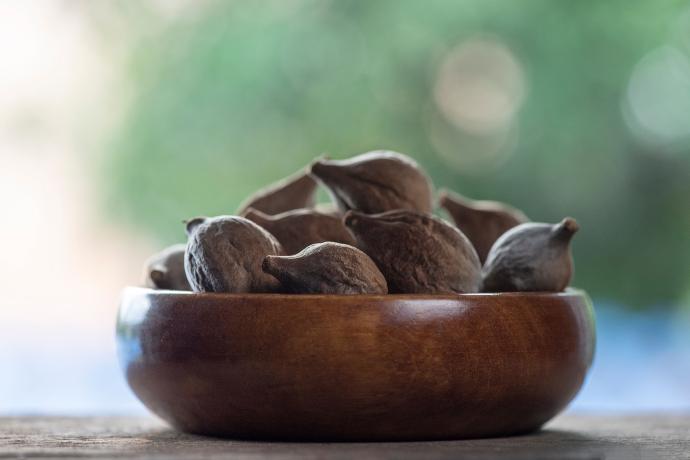
Beleric Myrobalan has various therapeutic effects, including its anti-caries, anti-oxidant, anti-collagenase, and anti-microbial activities.
(Ayurveda is India’s age-old heritage of traditional herbal medicine. It is considered the “science of life” because the ancient Indian system of health care focused on views of man and his illness.)
Dry ginger – Zingiber Officinale
Ginger is a flowering plant whose rhizome, ginger root, or ginger, is widely used as a spice and folk medicine. It has anti-bacterial, antifungal, antineoplastic, antioxidant, and anti-inflammatory properties.
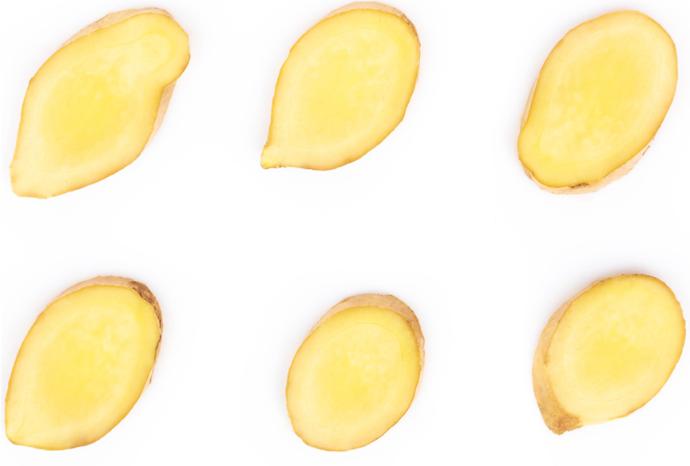
-
The anti-inflammatory properties of ginger improve the clinical symptoms of RAS – recurrent aphthous stomatitis.
-
Xerostomia refers to dry mouth sensation and ginger extracts increase the rate of salivation.
-
Effective against Candida albicans, which are the most common agents involved in oral infections.
-
A paste of ginger & honey can be effective in dental caries, mouth ulcers, and sore throat.
-
Reduces oxidative stress, inflammation, and periodontics
-
Ginger slows down the growth of bacteria and is effective for Gingivitis. (Gingival disease is defined as inflammation of the gingival tissues caused by an accumulation of dental plaque and is characterized clinically by redness, swelling, and bleeding of the tissues.)
Honey
Honey is a natural medicine that has anti-bacterial, anti-inflammatory, anti-ulcer, and antioxidant properties.

Made from the nectar of flowers by honey bees and has about 181 known substances and nutrients such as amino acids, natural carbohydrates, enzymes traces of minerals, the exact structure and composition of honey are often determined by (which plant sources) the honey bee took the nectar from.
Edinora Ayurvedic toothpaste uses premium-quality Kashmiri honey to offer the best dental care. The contents in the honey can help modify pH, reduce bacterial counts, and inhibit bacterial growth. It helps prevent gingivitis, inflammation, and caries in patients undergoing orthodontic treatment. Studies suggest that honey is also useful against streptococcus mutans infections, dental plaque, and halitosis. It is effective against oral ulcers that are caused by stress, thermal/chemical injury or acidic food, etc. and also hinders the growth of Candida Albicans.
Virgin coconut oil
Coconut oil is an easily available edible oil. It is unique because it contains predominantly medium-chain fatty acids, of which 45-50 percent is lauric acid. Lauric acid has proven anti-inflammatory and antimicrobial effects.
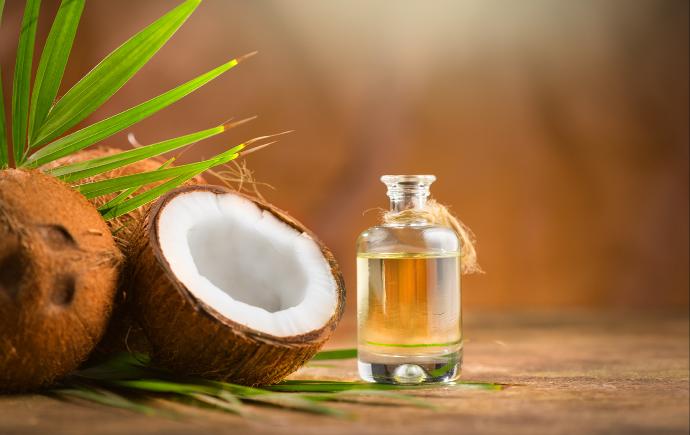
Various studies show that virgin coconut oil is effective in reducing plaque formation. The primary cause of gingival inflammation is plaque. Dental plaque is defined clinically as a structured, resilient substance that adheres to intraoral hard surfaces and is composed of bacteria in a matrix of salivary glycoproteins and extracellular polysaccharides. Plaque-induced gingivitis is the result of an interaction between plaque and the tissues and the inflammatory response of the host.
Aloe Vera Juice
Aloe Vera (Aloe Barbadensis) is a plant that belongs to the Liliaceae family. It plays a significant role in dentistry, especially in the treatment of lichen planus, oral submucous fibrosis, recurrent aphthous stomatitis, alveolar osteitis, periodontitis, etc.

Aloe Vera contains various minerals and vitamins and has several properties, such as immunomodulatory, antiviral, and anti-inflammatory. To date, 75 nutrients have been identified in the stabilized Aloe Vera gel. Saponins, glycoside soapy substances containing antiseptic properties, which are capable of cleansing, are thought to comprise about 3% of it. Along with this, there are other vitamins like Vitamin A, C, E, B1, B2, B3 (niacin), B6, choline, folic acid, alpha-tocopherol, and beta-carotene. Aloe Vera is also one of the few plants that contain Vitamin B12, Vitamins A, C, and E - the antioxidant vitamins essential in fighting against damaging free radicals.
In addition, Aloe Vera’s anti-inflammatory properties reduce gingival inflammation and periodontitis. It also supports wound healing and is effective in controlling bacteria. Studies suggest it is best to fight against Streptococcus mutans, Candida albicans, Lactobacillus Acidophilus, Streptococcus Mitis, Enterococcus Faecalis, Prevotella Intermedia, and Peptostreptococcus Anaerobius.
Black Pepper
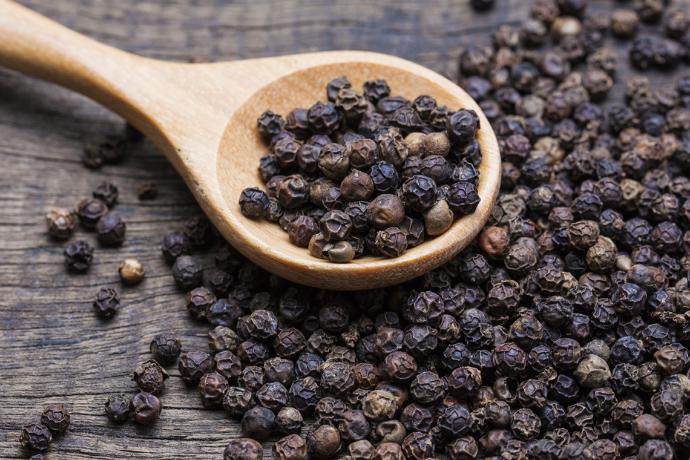
Black pepper (Piper nigrum) is a flowering vine in the family Piperaceae. It is used for the treatment of oral abscesses, tooth decay, and toothaches and is good for the reduction in gingival bleeding, oral hygiene, salivary anaerobic bacteria count, and overall improvement in oral hygiene. It is another important ingredient in Edinora Ayurvedic toothpaste.
Clove Bud
Syzygium aromaticum, commonly known as clove, is an aromatic flower bud of a tree belonging to the family Myrtaceae. It is used in Ayurvedic and Chinese medicine, western herbalism, and dentistry as well.
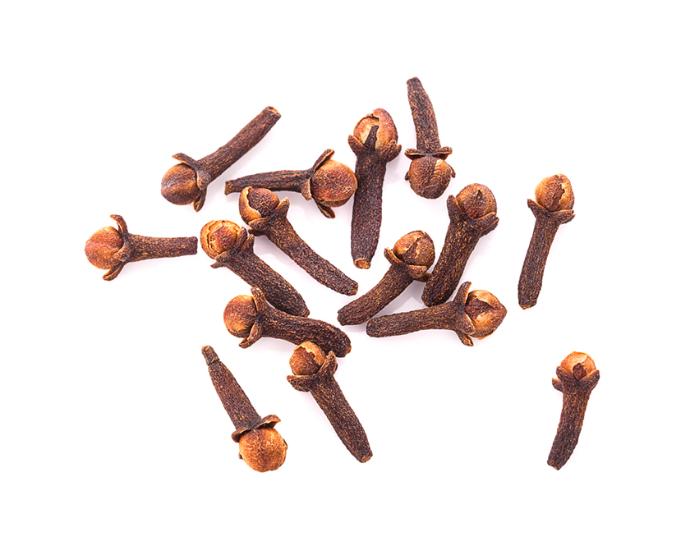
Clove is one of the natural products used to cure dental problems. It was used in China for over 2000 years for checking decay of the tooth and also for halitosis (bad breath). It is a medicinally important drug, reported to have a variety of different applications like antioxidant, antifungal antiviral, antibacterial, anti-inflammatory, antithrombotic, antipyretic, analgesic, anticonvulsant, antimycotic, insecticidal, antimutagenic, anti-ulcerogenic, etc. It prevents infections, and inflammations, and helps in the reduction of pain. Syzygium aromaticum Clove oil (Laung) is applied for toothache, dental caries, and pyorrhoea.
Cardamom
Cardamom is a seed pod, known since antiquity for its culinary and medicinal properties. The spice is native to the evergreen rainforest of southern India and is now grown in only a few tropical countries. Cardamom, also referred to as the “queen of spices” due to its pleasant aroma and taste, has a history as old as the human race.
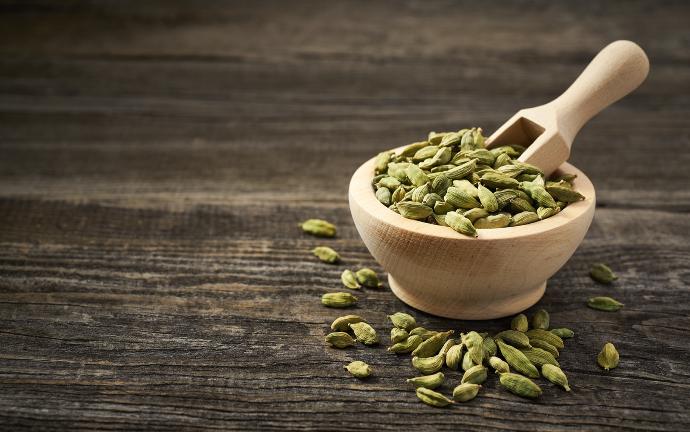
Cardamom is one of the most effective remedies against halitosis. Simply chewing on the seeds eliminates unpleasant odors. It is even used in some chewing gums because of its effectiveness, billed as a surefire cure to the most offensive breath.
Cardamom is widely used in South Asia to fight tooth and gum decay and disease. It can also be used to help soothe a sore throat and relieve hoarseness of the voice. Therefore, Edinora Herbal toothpaste made it a point to immensely use cardamom.
Cinnamon

Eucalyptus Oil

Eucalyptus trees, which are otherwise known as “gum trees” are members of the Myrtaceae family. It is best known for its antibacterial activity, anti-carcinogenic activity, and anti-plaque activity. Eucalyptus is effective in treating gum diseases as an anti-plaque agent for bleeding gums for halitosis stomatitis.
Peppermint
Peppermint (Mentha piperita L.), a sterile hybrid of the species M. Aquatica L. and M. Spicata, L. is considered one of the important aromatic herbs containing a high amount of volatile oil used in dental care. The peppermint leaves have a characteristic, aromatic, strong odor and an aromatic, warm, pungent taste followed by a cooling sensation.

M. Piperita L. is one of the most promising species with antibacterial potential against cariogenic bacteria such as Streptococcus Mutans. Peppermint oil and leaves possess several other biological effects as antiseptics in oral preparations. It has antibacterial, antiviral, antifungal, antioxidant, and antispasmodic effects. Concerning the importance of Peppermint in the remedy to dental caries, it can be considered one of the potent and highly safe drugs used for their treatment due to its effective antibacterial activity against cariogenic bacteria. It has significant benefits and is safe for humans with no considerable side effects or contraindications.
Rosemary
R. Officinalis L., popularly known as rosemary, is a plant belonging to the family Lamiaceae and originated in the Mediterranean region.

It is a perennial and aromatic plant, shrub-shaped with branches full of leaves, having a height of up to two meters, and green leaves that exude a characteristic fragrance. Some biological activities have been attributed to this plant, including antimicrobial, antibacterial, antifungal, antimycobacterial, anti-inflammatory, antitumor, antioxidant, and more. Studies show that Rosmarinus officinalis used in ayurvedic toothpaste is effective in controlling gingival bleeding and bacterial plaque when compared with conventional, fluoridated toothpaste.
Neem
Azadirachta indica, commonly known as Neem, is an evergreen tree. Since time immemorial, Indians have used it for the treatment of various diseases due to its medicinal properties.

It possesses anti-bacterial, anti-cariogenic, anti-helminthic, anti-diabetic, anti-oxidant, astringent, anti-viral, cytotoxic, and anti-inflammatory activity. Nimbidin, Azadirachtin, and nimbinin are active components present in Neem which are responsible for antibacterial activity. Neem bark also has antibacterial properties and is quite useful in dentistry for curing gingival problems and naturally maintaining oral health. Neem twigs are used as an oral deodorant, toothache relievers, and for cleaning teeth..
Neem has been extensively used in Ayurveda, Unani and Homoeopathic medicine and has become a wonder tree of modern medicine. It has been used traditionally for the treatment of inflammation, infections, fever, skin diseases, and dental problems. Studies show that regular brushing with herbal toothpaste containing neem will reduce the deposition of plaque, prevent caries, and enhance the immune response for overall oral health.
Turmeric
Turmeric, a rhizome of Curcuma longa, is well known for its medicinal propertie

It has proven properties like anti-inflammatory, antioxidant, antimicrobial, hepatoprotective, immunostimulant, antiseptic, and antimutagenic. Due to these properties, it is quite useful in dentistry. It has a role in the treatment of periodontal diseases and oral cancers. Curcumin has been used extensively in Ayurvedic medicine for centuries, as it is non-toxic and has a variety of therapeutic properties including anti-oxidant, analgesic, anti-inflammatory, antiseptic activity, and anti-carcinogenic activity.
As a natural product, turmeric (curcumin) is non-toxic and has diversified effects on various oral diseases. Massaging the aching teeth with roasted ground turmeric eliminates pain and swelling. It protects against free radical damage because it is a strong anti-oxidant.